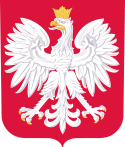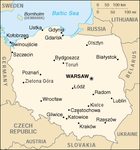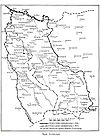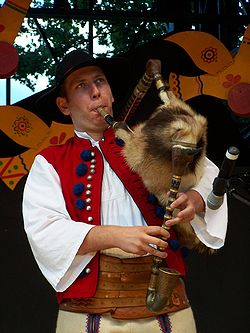- Portal:Poland
-
- Wikipedia portals:
- Culture
- Geography
- Health
- History
- Mathematics
- Natural sciences
- People
- Philosophy
- Religion
- Society
- Technology
Welcome to the Poland Portal
Witaj w Portalu o PolscePoland is a country in Central Europe, bordered by Germany to the west; the Czech Republic and Slovakia to the south; Ukraine, Belarus and Lithuania to the east; and the Baltic Sea and Russia's Kaliningrad Oblast to the north. It is an ancient nation that was conceived near the middle of the 10th century. Its golden age occurred in the 16th century when it united with the Grand Duchy of Lithuania to form the Polish–Lithuanian Commonwealth. During the following century, the strengthening of the gentry and internal disorders weakened the nation. In a series of agreements in the late 18th century, Russia, Prussia and Austria partitioned Poland amongst themselves. It regained independence as the Second Polish Republic in the aftermath of World War I only to lose it again when it was occupied by Nazi Germany and the Soviet Union in World War II. The nation lost over six million citizens in the war, following which it emerged as the communist People's Republic of Poland under strong Soviet influence within the Eastern Bloc. A westward border shift followed by forced population transfers after the war turned a once multiethnic country into a mostly homogeneous Polish state. Labor turmoil in 1980 led to the formation of the independent trade union called Solidarity that over time became a political force which by 1990 had swept parliamentary elections and the presidency. A shock therapy program during the early 1990s enabled the country to transform its economy into one of the most robust in Central Europe. With its transformation to a democratic, market-oriented country largely completed, Poland is an increasingly active member of NATO and the European Union.
From Polish history
Zaolzie (Czech: Zaolší) is a historical region on the left bank of the Olza River on the Czech–Polish border. Historically part of the Duchy of Teschen (Cieszyn, Těšín), it belonged to Austria-Hungary until its dissolution in 1918. Afterwards, it became a bone of contention between the nascent republics of Poland and Czechoslovakia. The region, inhabited by ethnic Poles, Czechs and Jews, was rich in coal and crossed by a strategic railway linking Czech Silesia with Slovakia. Agreements between local authorities, armed fighting and an ettempted plebiscite proved inconclusive and in 1920 the Council of Ambassadors settled the matter at the Spa Conference by awarding Zaolzie to Czechoslovakia. In 1938, Poland issued an ultimatum to its southern neighbor to withdraw from Zaolzie within 24 hours, and on the following day Czechoslovakia complied. Poland annexed the region and became seen as an accomplice in the partition of Czechoslovakia resulting from the Munich Agreement. Zaolzie was annexed by Nazi Germany after the German invasion of Poland a year later and returned to Czechoslovak hands with the end of World War II. Today, the area is part of the Czech Republic and home to about 37,000 ethnic Poles. After 2001, several villages in the region have erected bilingual signs in Czech and Polish. Selected picture
Przemysław Ficek, the leading member of the folk band Fickowo Pokusa, plays the bagpipes during the 43rd Beskidy Highlanders' Week of Culture, a festival promoting the culture and lifestyle of the Gorals, or highlanders, from the Beskid Mountains along Poland's southern border. Ficek represents an ethnic group known as górale żywieccy, living in the Żywiec Beskids around the town of Żywiec.
Did you know
From Wikipedia's newest articles about Poland:
- ... that Prussian Homage (fragment pictured) by Jan Matejko was among the most wanted Polish paintings searched for by the Nazis during World War II?
- ... that both the Tarnogród Confederation and the Silent Sejm were engineered by Emperor Peter the Great to strengthen Russia's influence in the Polish-Lithuanian Commonwealth?
- ... that the same Partition Sejm that acceded to the First Partition of Poland also created the Commission of National Education, regarded as Europe's first ministry of education?
- ... that Wojciech Pietranik was told to replace the Sydney Opera House with the Roman Colosseum in his design for the Sydney 2000 Olympic medals?
Archive – Start a new article
You can help!
Selected biography
Witold Pilecki (1901–1948) was a Polish soldier, founder of the Secret Polish Army resistance group and member of the Home Army during World War II. He was the only person to volunteer to be imprisoned at the Auschwitz Concentration Camp. While there, he organized inmate resistance, and as early as 1940, informed the Western Allies of Nazi Germany's Auschwitz atrocities. He escaped from the camp in 1943 and took part in the Warsaw Uprising. Pilecki was executed in 1948 by communist authorities. Until 1989, information on his exploits and fate was suppressed by the Polish the communist regime. Selected location
Sosnowiec is a city located in the Upper Silesian Metropolitan Union although, historically and culturally, it is part of the Dąbrowskie Basin (Zagłębie Dąbrowskie). Thanks to rich natural resources and a strategic location on the border of Russian, German and Austro-Hungarian empires, the village of Sosnowiec grew rapidly during the 19th century and was granted a town charter in 1902. Another period of vigorous development occurred in the 1970s, when Edward Gierek, a native of Sosnowiec, served as first secretary of the communist Polish United Workers' Party. On the city's centennial in 2002, the city center (pictured) was thoroughly rebuilt and modernized. Some coal mines and steel mills continue to operate in Sosnowiec as trade and service sectors are expanding.
Poland now
Recent or ongoing events:
- On 8 November, Anna Grodzka (Palikot's Movement) was sworn in as Poland's first transsexual member of parliament, while Ewa Kopacz (Civic Platform) was elected Poland's first female marshal of the Sejm.
- On 1 November, Tadeusz Wrona performed a successful belly landing of a LOT Polish Airlines Boeing 767 at the Warsaw Chopin Airport.
- During the second half of 2011, Poland holds the rotating presidency of the Council of the European Union (European and Polish flags pictured).
Upcoming events:
- In 2012, Poland and Ukraine will jointly host a UEFA European Football Championship.
Holidays and observances in November 2011:
- All Saints, 1 November
- Independence Day, 11 November
Categories
[×] Time in PolandTopics
Related portals
Wikimedia

Poland on Wikinews
News
Poland on Wikiquote
Quotes
Poland on Commons
Images
Poland on Wikisource
TextsWikipedia in the languages of Poland

Kaszëbskô Wikipedijô
Kashubian Wikipedia
Polska Wikipedia
Polish Wikipedia
Ślůnsko Wikipedyjo
Silesian WikipediaБеларуская • Česky • Deutsch • Հայերեն • Lietuvių • Romani • Русский • Slovenčina • Українська • ייִדיש
Categories:- European portals
- Poland
Wikimedia Foundation. 2010.









